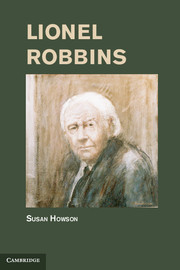Book contents
- Frontmatter
- Contents
- Illustrations
- Abbreviations
- Introduction
- One Father and Son
- Two The Great War
- Three Postwar
- Four The London School of Economics
- Five Iris Gardiner
- Six New College Oxford
- Seven The Young Professor
- Eight Fritz and Lionel
- Nine The School in the Mid-1930s
- Ten The Approach of War
- Eleven The Economics of War
- Twelve Director of the Economic Section
- Thirteen Anglo-American Conversations
- Fourteen The Law Mission and the Steering Committee
- Fifteen 1 9 4 4
- Sixteen The Last Months of the War
- Seventeen The Postwar Settlement
- Eighteen Return to the School
- Nineteen The End of the Transition
- Twenty LSE in the Early 1950s
- Twenty-One Chairman of the National Gallery
- Twenty-two Lord Robbins
- Twenty-three The Robbins Report
- Twenty-four The Sixties
- Twenty-five The Arts
- Twenty-six The Troubles at LSE
- Twenty-seven Retirement
- Conclusion
- Bibliography
- Index
Nineteen - The End of the Transition
Published online by Cambridge University Press: 07 October 2011
- Frontmatter
- Contents
- Illustrations
- Abbreviations
- Introduction
- One Father and Son
- Two The Great War
- Three Postwar
- Four The London School of Economics
- Five Iris Gardiner
- Six New College Oxford
- Seven The Young Professor
- Eight Fritz and Lionel
- Nine The School in the Mid-1930s
- Ten The Approach of War
- Eleven The Economics of War
- Twelve Director of the Economic Section
- Thirteen Anglo-American Conversations
- Fourteen The Law Mission and the Steering Committee
- Fifteen 1 9 4 4
- Sixteen The Last Months of the War
- Seventeen The Postwar Settlement
- Eighteen Return to the School
- Nineteen The End of the Transition
- Twenty LSE in the Early 1950s
- Twenty-One Chairman of the National Gallery
- Twenty-two Lord Robbins
- Twenty-three The Robbins Report
- Twenty-four The Sixties
- Twenty-five The Arts
- Twenty-six The Troubles at LSE
- Twenty-seven Retirement
- Conclusion
- Bibliography
- Index
Summary
By the time Mises wrote to Robbins in November 1947 the Michaelmas term was well underway. With ‘the curse of Kaldor’ (as he described it to Kaldor on 22 October 1948 [Kaldor NK7/2/12]) upon him, Robbins was delivering Principles lectures four times a week (Wednesday and Friday mornings and Tuesday and Thursday evenings) as well as The Theory of Economic Policy on Friday evenings. Other mornings were taken up with correspondence and academic chores, afternoons with committees and his dozen graduate students as well as the seminar. He was worried about his father, who had collapsed while working in his garden one day in October (ICR to LCR, 7 October 1947). By December he ‘looked so end-of-termish and pre-occupied’ when Norman Chester saw him at the Reform Club, that Chester could not bring himself to ask Robbins for his promised contribution to a volume on the war economy (Chester 1951). He told Chester he was ‘living the life of a monk…[not] the kind of life I intended to lead when I left the public service’. He wrote an equally gloomy letter to Caroline’s husband, Joe Herben, on 27 December. Thanking him for a present of cigars, as well as for earlier gifts which had helped to sustain the standards of consumption of the Robbins household since 1940, he would not volunteer to do the same for Joe some day, ‘for that would imply that the U.S. (which is the hope of the world) would also have to go through this valley of the shadow of frustration & mediocrity – which God forbid’! He was not optimistic about Britain’s immediate future in spite of the possibility of Marshall Aid. One of the few bright spots on the horizon was that Richard should be demobilized by the spring and would go up to New College in the autumn, after a spell as an art student at Goldsmiths where his uncle Clive was teaching. Fortunately for Lionel, Iris and Anne insisted he should have a short seaside holiday in Brighton before the new term: as he told Chester on 16 January (Letters to and from Economists 1.11.47–31/12/48, RP), ‘They could not prevent me from working, but they managed to get a good deal of fresh air into my lungs.’
- Type
- Chapter
- Information
- Lionel Robbins , pp. 681 - 711Publisher: Cambridge University PressPrint publication year: 2011



